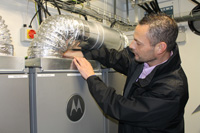|
David Taylor visits a base station near the Olympic Park in London, run by the UK TETRA network provider Airwave, to see how a new heating extraction system is saving the company money and boosting its sustainability credentials You used to be able to cook an egg on the equipment. Now you can put your hands on it”, said Peter Keen, Airwave service manager, describing how effective the new heating extraction solution has been. Airwave provides critical voice and data communications to public service organizations in Great Britain. Mr Keen explained the idea came to them last year when the company was implementing a new network in London for the Olympic Games organizing committee. Airwave base stations are traditionally cooled by air-conditioning units but the extra equipment needed to expand the network during last summer meant this was costing a lot of money. “We were sat round a conference table with the challenge that we were having to spend a lot of money to cool London”, said Mr Keen. “Whereas there used to be only three racks, we’ve now added six racks, two banks of batteries, plus extra resilience, so we needed to add a lot more power to the sites. This meant a huge, huge, frighteningly large bill.” This led them to think: “Why are we cooling air in a box? Why don’t we just get rid of it? And that’s where the idea came from.” Martin Benke, director of network operations at Airwave, helped explain the concept: “Hot air was coming off the racks, into the room, and air-conditioning was cooling it. We solved the problem by blowing the hot air directly out. Very simple, very innovative, but it reduced the air-conditioning bill significantly, and keeps the racks much cooler so we can get in there and work. It’s just a simple fan running away, rather than air-conditioning.” Mr Keen expanded on this, saying: “Effectively, what you’ve got is similar to a toilet extraction fan. And that is just pulling air. Where does the air come from? Outside.” The trials were so successful that it was rolled out to 36 sites around London immediately. “The kit [base radios] will cope up to 55 degrees, the batteries want about 20 degrees. 18-24 degrees is their best operating temperature. With this installed, we can maintain that without having the cold air blowing around. The air-conditioning unit used to be on 24/7. We weren’t getting rid of anything, we were just cooling a hot box.” He continued: “What we’ve added now, our most recent innovation, is speed controllers. So, if the ambient temperature outside drops to below 10 degrees, I don’t want to be pulling too much cold air in. The other day it was -4 degrees. With the speed controller on the fan we just switched the fan so it was on tick-over. It was still keeping the kit cool, but it was only just ticking over. When it gets to 30 degrees outside they’ll want to do a little bit more. It means that we’re not hitting any dew points so we don’t get any condensation. Condensation is potentially damaging to the equipment. “Feasibly, you could use this at any air-conditioned site. With the modification on it this principle could eradicate air-conditioning.” Mr Benke estimates that the savings could be in the thousands, adding: “It’s not just the cost implication of it – it’s good we’re spending less on electricity, but we’re also promoting our sustainability. This is a greener solution than having simple air-conditioning. This is a clear demonstration of our ability to think a bit innovatively, with something that saves us money and helps us improve our sustainability credentials as well. “Circuitry, generally, doesn’t like temperature variations and lasts less time at higher temperatures. We keep it at a constant cooler temperature and things tend to last longer.” Mr Keen concluded: “As a result, we’ve had no high temperature alerts in London on the blue light network, which is quite an achievement.”
(中国集群通信网 | 责任编辑:陈晓亮) |

